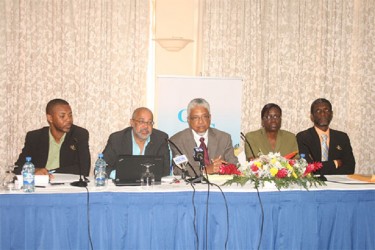Eleven papers in seven subjects would be electronically marked from the May/June 2014 sitting of the Caribbean Secondary Education Certificate (CSEC) examinations, according to the latest update on the introduction of electronic-marking (e-marking) by the Caribbean Examination Council (CXC).
This was revealed in the communiqué issued at the conclusion of the 45th meeting of CXC and a meeting of the Schools Examinations Committee (SEC) last week in Guy-ana, which also saw reporting by CXC Registrar Dr Didacus Jules on the Council’s transformation agenda, including the development of its 2014 to 2020 Strategic Plan and new syllabuses for the Caribbean Advanced Proficiency Examination (CAPE).
According to the communiqué, the SEC meeting, held last Thursday, was updated on the process involved in e-marking as part of CXC becoming an IT-Intelligent organization with plans that also include sharing educational content via cellphones. After next year’s introduction, it noted, 22 papers are to be e-marked from the January 2015 CSEC examinations sitting, and 24 papers from the May/June 2016 sitting.

The SEC, it was explained, was advised that teachers would be trained to engage in e-marking. In addition, the communiqué said the SEC noted the quality of the e-marking would be monitored using the same process as table marking, which involved Chief Examiners, Table Leaders and Examiners.
It was further noted that a cost benefit evaluation on the e-marking initiative was conducted to examine the payback period and the net present value. “In each case, over the next 2-3 years, the Council would recover funds invested and possibly realize savings in those particular cases,” the communiqué said.
Addressing CXC’s strategic plan, Dr Jules was reported as saying that the Council will concentrate on three strategic objectives: strengthening the CXC business model, securing financial stability and delivering an enhanced stakeholder experience.
The CXC strategy will endeavour to enable every Caribbean person, including out of school candidates, the opportunity to be certified, having the knowledge, skills and competence, Dr Jules added.
“The new strategic plan has been built on some of the significant things that the registrar has managed,” CXC Chairman Dr. Nigel Harris also told a news conference last Friday after the conclusion of the Council’s meeting.
He said the meeting involved interesting and innovative plans for change and considerable interaction by the delegates, who provided inputs to ensure that the changes would positively impact all of Caribbean education.
“This meeting, as the last few, has been very important for us because it includes what has been the process in which we are involved—which is being led by the registrar for CXC, ably assisted by the Pro-Registrar Glenroy Cumberbatch and team—…an effort to not only transform the whole CXC system… but indeed to work to have an impact in all of education, from primary through secondary, even impacting on tertiary education…,” he added.
Meanwhile, the communiqué also noted that the Council approved the budget for 2014, which provides for projected revenue of 50.5 million Barbados dollars and total expenditure of 50.3 million Barbados dollars. “The budget provides for key areas such as syllabus development and maintenance, examinations preparation and administration, business development, technology renewal, human resource management, research and development and marketing and stakeholder relationship management,” according to the communiqué.
According to the communiqué, the meeting of SEC noted that the syllabuses for CAPE Agricul-tural Science, Performing Arts, Tourism, and Entrepreneurship were completed and approved by the Sub-committee (SUBSEC) for teaching starting in September 2014 and first examination in May/June 2015. The Digital Media syllabus was completed and approved for teaching in September 2013 and first paperless examination in May/June 2014.
Digital Media is intended for students who are good at English. They will be able to post information on blogs and will be accessed for free through the region’s e-learning website, caribbean.notesmaster.com. Educational content on cellphones is also set to be promoted by the Council and the Caribbean Notesmaster website.
SEC was informed that SUBSEC approved the development of a syllabus for Animation and Game Design for CAPE, while the syllabus for CAPE Physical Education and Sport was under review and would be submitted for the approval of SUBSEC at its next meeting.
It was further noted that two changes were effected to the administration of the Caribbean Certificate of Secondary Level Compe-tence (CCSLC) during 2013: the award of individual subject certificate as well as grouped subjects certificate, and offering the programme to out-of-school candidates. The out-of-school candidates would register in education institutions approved as CXC examination centres, which would follow the same procedures and processes as schools, according to the communiqué.





